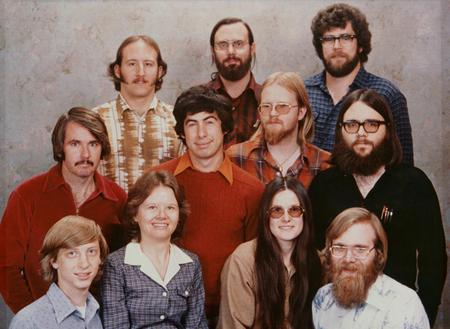Success story of Bill Gates
Read how the bluff of Bill Gates at IBM was the origin of a very successful tech startup: Microsoft Corporation.

This is the inspiring success story of Bill Gates, the technological pioneer, and philanthropic giant who co-founded Microsoft Corporation, shaping the landscape of personal computing and leaving an indelible mark on the world. There are numerous webpages about Bill Gates. Within the context of this site, we will focus on his remarkable strategy to sell an operating system to IBM while retaining the right to sell the software outside the IBM boundaries.
Early Years
Born on October 28, 1955, in Seattle, Washington, William Henry Gates III displayed an early aptitude for programming. At the young age of 13, he developed his first computer program and later enrolled at Harvard University, where he met Paul Allen, his future business partner. He left Harvard University in 1975 to pursue his passion for computer programming and co-founded Microsoft with Paul Allen. Despite not completing his formal education, Gates went on to become one of the most successful and influential figures in the technology industry.
Founding Microsoft
In 1975, Gates and Allen founded Microsoft, with a vision to put a computer on every desk and in every home. Their first major success came with the development of the BASIC programming language for the Altair 8800, a groundbreaking moment that marked the beginning of Microsoft's ascent.
Windows Revolution
Microsoft's most significant breakthrough came with the introduction of the Windows operating system in 1985. Windows transformed personal computing, providing a user-friendly interface that made computers accessible to a broader audience. The iconic Windows platform became synonymous with PC computing and laid the foundation for Microsoft's dominance in the software industry.
Entrepreneurial Vision
Bill Gates' entrepreneurial vision extended beyond software. Under his leadership, Microsoft diversified into various technology sectors, including productivity software, gaming (Xbox), and enterprise solutions. His strategic decisions and commitment to innovation solidified Microsoft's position as an industry leader.
Philanthropy and Giving Back
In 2000, Bill Gates, along with his then-wife Melinda, established the Bill & Melinda Gates Foundation, one of the world's largest private charitable foundations. The foundation focuses on global health, education, and poverty alleviation, aiming to make a positive impact on the lives of millions around the world.
Legacy
Bill Gates stepped down from his day-to-day role at Microsoft in 2008 but continued to be involved in shaping the future of technology and contributing to social causes. His legacy as a visionary entrepreneur, software architect, and philanthropist remains an enduring inspiration for aspiring innovators and changemakers worldwide.
IBM Deal and MS-DOS
The story about the birth of MSDOS goes like this. When Bill Gates heard that IBM was looking for an Operating System (OS) for the IBM PC, he stepped in and claimed he could deliver the desired OS. In reality, however, Gates had never written an operating system before. Yet, he was aware that a software developer living just a few streets away had created a 'Quick and Dirty Operating System' (QDOS) for microcomputers. Gates acquired QDOS for $50,000, keeping the original creator unaware of the impending deal with IBM (although other stories tell that Microsoft actually hired the original developer of the OS to make the necessary modfications and sold the OS for $50.000 to IBM). After making (or arranging) essential modifications to the software, Gates returned to IBM and successfully secured a global deal. However it happened, the pivotal aspect of the agreement Gates forged with IBM was that the Microsoft he had established, retained the rights to sell the rebranded QDOS, known as MS-DOS, beyond the confines of the IBM-PC project. While the exact details of the negotiations remain unknown, one can envision IBM exerting every effort to acquire complete rights, countered by Gates' determination to preserve those rights. Gates foresaw a future where every American family would own a personal computer. His swift calculation, possibly on the edge of a beer mat, revealed that the potential gains far surpassed any offer IBM could present. Gates skillfully asserted his conditions at IBM, and the rest is history. The crux was that Gates founded Microsoft, retained OS rights, renamed it MS-DOS, and sold it outside the IBM project.
Remarkably, at the young age of his mid twenties, Gates made a groundbreaking move by selling the operating system to the computer giant IBM, a decision that would shape the future of the tech industry.
For a tech startup, the lesson is clear: when the technology is good enough, it is good enough. Strive for progress, not perfection. Make money as soon as possible to avoid the graveyard of improvement infinity.
Of course, there are still some comments to be made. The OS worked, but its quality is still debated because many consider DOS as a completely inferior system. But it worked, and it worked well enough to convince IBM. Bill managed to present a Proof of Concept that met expectations, and that's what matters. The lesson we can draw from this is that things can always be better, but the question is what is sufficient at the moment to progress with an idea or invention. Additionally, it was crucial that IBM was specifically looking for a working OS (the Need to have). To some extent, it is also sheer luck that at that moment and in that place, Bill Gates could fulfill that need. On the other hand, he didn't think that IBM would be too big to talk to him or that he would first perfect the OS and retreat to his attic to program it for years. If he had done that, we probably would never have heard of Bill Gates. That programming would come later... as well as the battles with the authorities. But in the '80s, they were not yet concerned with PCs and monopoly positions in operating systems.
Despite debates on MS-DOS quality, it met IBM's expectations, demonstrating the importance of meeting current specifications. The story emphasizes the need to focus on what is necessary to move forward with your ambitions.
IBM and a "Need to Have"
Conclusive, IBM was looking for a working OS (the Need to Have), and Gates was fortunate to fulfill that need. Luck played a part, considering the challenges of dealing with a giant like IBM. Gates' foresight and negotiation skills shaped the success story, highlighting the importance of seizing opportunities when they arise.
